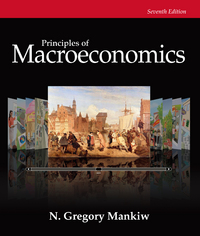Answered step by step
Verified Expert Solution
Question
1 Approved Answer
This activity aims to visually represent and organize critical concepts related to the North American Free Trade Agreement (NAFTA) and its evolution into the United
This activity aims to visually represent and organize critical concepts related to the North American Free Trade Agreement (NAFTA) and its evolution into the United States-Mexico-Canada Agreement (USMCA). Make a conceptual map to help you grasp the interconnected elements, understand the economic implications, and identify the benefits and challenges of these regional economic integration steps.
- Identify Key Concepts:Identify the central concepts related to NAFTA and USMCA. These may include economic implications, benefits, challenges, and involved nations.
- Create Main Nodes:Establish central nodes for broad categories, such as "Economic Implications," "Benefits," and "Challenges." These will serve as the primary branches of your conceptual map.
- Expand with Sub-Nodes:Under each primary node, add sub-nodes for more specific concepts. For instance, under "Economic Implications," you can have sub-nodes like "Trade Impact," "Labor Market Changes," and "Intellectual Property Considerations."
- Connect Concepts:Use lines or arrows to connect related concepts. This helps illustrate the relationships between different elements, fostering a better understanding of how they interact.
- Include Real-Life Examples:Incorporate real-life examples and case studies to support your concepts. For instance, you can link "NAFTA Case Studies" nodes to relevant concepts.
- Utilize Measurable Verbs:Integrate measurable verbs from the discussion module to enrich your conceptual map further. For example, use "Evaluate" and "Assess" as nodes to prompt critical analysis.
- Visual Elements:Enhance your conceptual map with visual elements. Use different colors, shapes, or icons to distinguish between nodes and make a visually engaging map.
- Add Contextual Information:Provide brief descriptions of key points for each concept to ensure clarity. This will serve as a reference when reviewing or presenting your conceptual map.
- Review and Refine:Review your conceptual map to ensure it accurately represents the relationships between concepts. Adjust as needed to enhance clarity and coherence.
- Share and Discuss:Share your conceptual map with your peers or colleagues. Discuss the map to gain additional insights and perspectives on the NAFTA/USMCA.
- Topic submission:Submit your conceptual map digitally, ensuring it communicates the relationships and concepts related to NAFTA and USMCA. Include at least three academic sources, formatted and cited in APA.
Step by Step Solution
There are 3 Steps involved in it
Step: 1

Get Instant Access to Expert-Tailored Solutions
See step-by-step solutions with expert insights and AI powered tools for academic success
Step: 2

Step: 3

Ace Your Homework with AI
Get the answers you need in no time with our AI-driven, step-by-step assistance
Get Started


